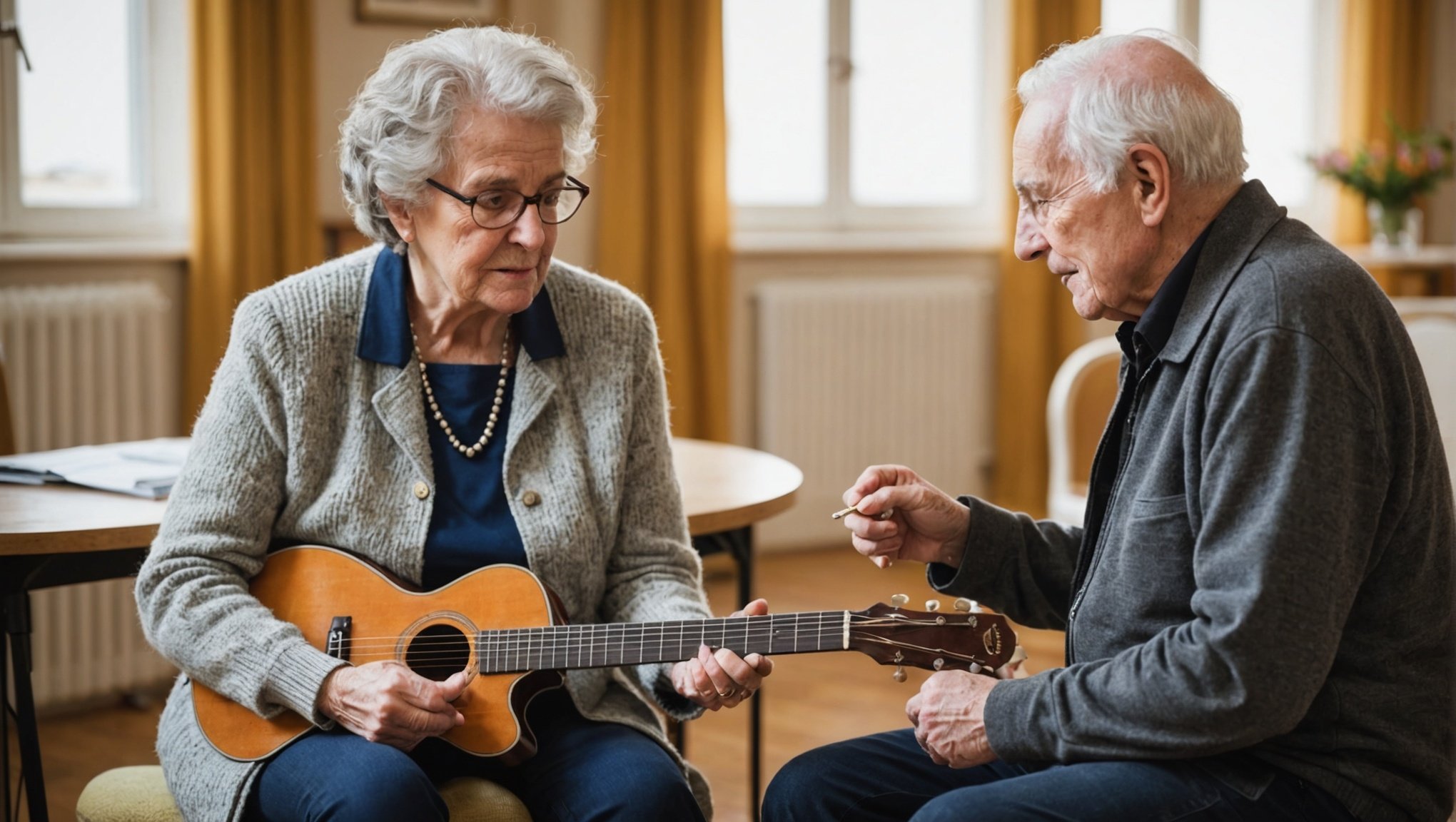Over the years, music therapy has gradually earned recognition as a potent alternative or complementary intervention in the health care sector. A growing number of scholarly research and studies have demonstrated its various health benefits, especially for older adults suffering from conditions like depression and dementia. Music therapy, an intervention led by a trained therapist using music and its elements, can have a profound impact on mental health.
The Intrinsic Connection Between Music and Mental Health
Before diving into the potential therapeutic benefits of music for the elderly, let’s shed some light on the fundamental relationship between music and mental health.
Topic to read : How Does Continuous Glucose Monitoring Impact Lifestyle Choices in Adolescents with Type 2 Diabetes?
Music has been deeply interwoven into human societies since time immemorial. It’s an integral part of our lives, directly impacting our emotions and mood. From the soothing lullabies that put us to sleep as infants, to the energetic beats that fuel our workout sessions, music has a profound influence on our emotional states.
Numerous studies have examined this relationship, revealing that music can stimulate the release of particular chemicals in the brain, such as dopamine and oxytocin, associated with feelings of pleasure and social connection. Consequently, it’s no surprise that healthcare professionals have begun to investigate the potential therapeutic applications of music.
Also read : What Are the Pros and Cons of Telehealth for Managing Chronic Respiratory Diseases?
The Role of Music Therapy in Medicine
The application of music as a therapeutic technique is a fairly recent development in medicine. Music therapy emerged as a distinct discipline in the mid-20th century, following World War II, when musicians would perform at hospitals for war veterans suffering from physical and emotional trauma. Medical professionals noticed the positive effects of these performances on patients’ health and morale, and the concept of music therapy was born.
Today, music therapists are board-certified professionals who use active or receptive music interventions, tailored to individual patient’s needs and preferences. Active interventions refer to patients actively engaging in music-making, such as singing, drumming, or playing other instruments, under the guidance of a therapist. On the other hand, receptive interventions involve patients simply listening to music, either performed live or recorded.
The Impact of Music Therapy on Depression in Older Adults
With an aging population, depression among older adults has become a significant public health concern. According to Google’s analysis of health search trends, queries about ‘depression in the elderly’ have seen a steep rise over the past few years. Traditional medicine, while effective to an extent, may not be the perfect solution for everyone. This is where music therapy can play a significant role.
Several studies have shown that music therapy can be beneficial in reducing symptoms of depression among elderly patients. In a review of 17 studies conducted by Choi, Lee, and Lim, for example, the authors found that music therapy had a medium-to-large effect on depression symptoms in older adults.
Furthermore, music therapy offers a unique, non-pharmacological approach to managing depression. This makes it especially suitable for older adults who may have contraindications with certain medications or prefer not to take additional drugs.
The Therapeutic Effects of Music on Dementia Patients
Another significant area where music therapy can make a difference is dementia care. Dementia, a degenerative brain disease affecting memory, thinking, behavior, and emotion, is prevalent in the elderly population.
Evidence suggests that music therapy can significantly improve the quality of life for patients with dementia. Music, particularly familiar and personally significant tunes, can evoke memories, promote communication, and reduce anxiety and agitation often associated with dementia.
A study by Raglio and colleagues demonstrated that dementia patients who participated in regular music therapy sessions showed significant improvements in mood, social interactions, and overall cognitive performance compared to those who didn’t partake in music therapy.
Despite the burgeoning evidence highlighting the numerous benefits of music therapy, it is imperative to note that it doesn’t replace traditional medical treatments. It functions best as a complementary approach, enhancing the overall care and wellbeing of the patients.
All in all, music therapy appears to be a promising avenue in improving mental health among older adults. As research continues to unravel its full potential, it could pave the way for more holistic, patient-centered care in the future.
Exploring the Mechanisms of Music Therapy
To understand how music therapy works, it’s crucial to delve into the mechanisms behind it. Essentially, music therapy leverages the inherent qualities of music to facilitate communication, expression, and personal development. This therapeutic modality can be delivered in both individual and group settings, depending on the needs and preferences of the elderly participants.
Music therapy involves a variety of music-based activities, all designed to foster therapeutic changes. Here’s how a typical session may look like: a certified music therapist would use an array of techniques such as improvisation, songwriting, and guided music listening. In an active music intervention, older adults may be encouraged to play an instrument, sing, or even create their own musical composition. Research has shown that active engagement in music can lead to significant improvements in cognitive functioning, mood, and overall well-being.
Conversely, during a receptive music intervention, older adults are given the opportunity to simply listen to music. The therapist might play live music or recorded tracks, often chosen for their emotional resonance or personal significance to the participant. They may also guide the participant through a discussion about the music, exploring its emotional impact, personal associations, and potential therapeutic value.
In a meta-analysis on music therapy for older adults with depressive symptoms, Maratos, Gold, Wang, and Crawford found that both active and receptive music interventions can significantly reduce depressive symptoms. The authors concluded that music therapy offers an effective and well-tolerated treatment for depression in older adults.
Incorporating Music Therapy in Elderly Care
With the growing acknowledgment of the potential of music therapy in addressing mental health issues in older adults, its integration into elderly care is increasing. Music therapists are now often involved in multidisciplinary teams in a range of settings, including hospitals, nursing homes, and community centers.
These professionals work closely with the elderly, their families, and other healthcare providers to formulate individualized treatment plans. The therapeutic goals may range from alleviating depressive symptoms and managing stress to enhancing social interactions and improving the overall quality of life.
However, as with any therapeutic intervention, the effectiveness of music therapy varies from person to person. Factors such as individual musical preferences, cultural backgrounds, and personal histories can significantly influence therapeutic outcomes. Therefore, personalized music interventions that take into account these factors are of paramount importance.
Despite the promising findings, further research is needed to fully understand the potential benefits and challenges of music therapy for older adults. Numerous randomized controlled trials and systematic reviews are underway, aiming to provide more robust evidence on this front.
Conclusion: Music Therapy – A Harmonious Blend of Art and Science
In conclusion, music therapy appears to be a valuable tool in the arsenal of elderly care. It offers an alternative, non-pharmacological approach to managing mental health conditions such as depression and dementia. With its dual nature of art and science, music therapy can provide a holistic and person-centered approach to healthcare.
Research, such as those found on Google Scholar, continually demonstrates the potential of music therapy in reducing depressive symptoms among older adults. By promoting emotional expression, fostering social connections, and enhancing well-being, music therapy can contribute significantly to improving the mental health of the elderly.
Nonetheless, it’s essential to remember that music therapy should be used as a complementary treatment, working in tandem with traditional medical care. Music therapy alone might not be sufficient to treat severe clinical conditions, but its utility in boosting overall well-being and quality of life is undeniable.
As we march forward in the era of patient-centered care, the role of music therapy in elderly care is set to become increasingly prominent. As clinicians, therapists, and caregivers, we must continue to explore, understand, and harness the therapeutic power of music for the betterment of our elderly population.











